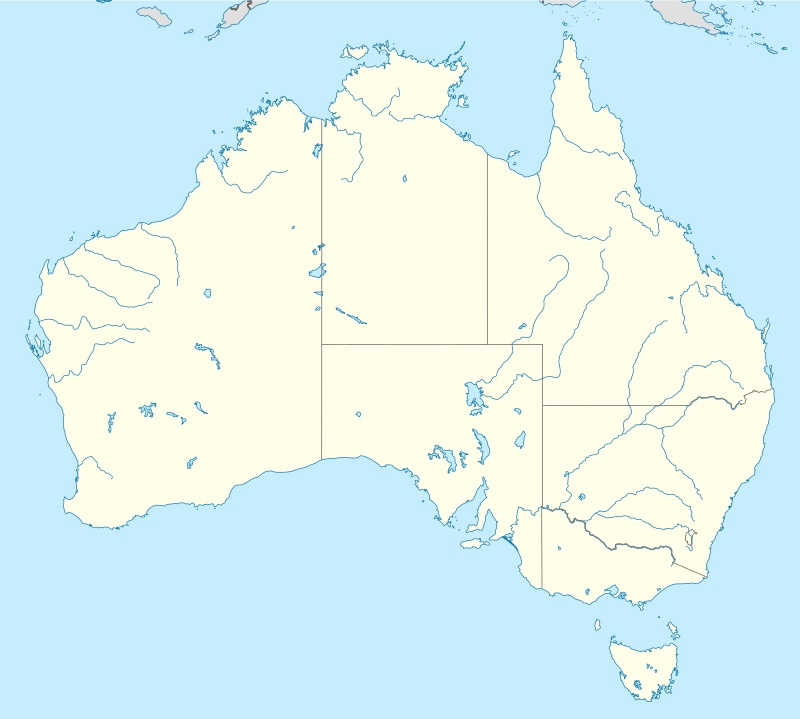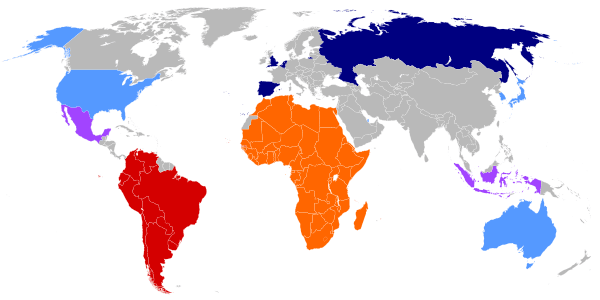Australia 2022 FIFA World Cup bid
Australia submitted an unsuccessful bid for the 2022 FIFA World Cup. On 2 December 2010 FIFA announced that the event would be held in Qatar.[1] Australia also lodged a bid for the 2018 World Cup, but withdrew the bid on 10 June 2010.[2] The 2018 and 2022 World Cups will be the 21st and 22nd editions of the FIFA World Cup. The bidding procedure to host both the 2018 and 2022 FIFA World Cup began in January 2009, and national associations had until 2 February 2009 to register their interest.[3] The bid was presented by Frank Lowy, Ben Buckley, Quentin Bryce and Elle Macpherson.[4]

Schedule
| Wikinews has related news: |
| Date | Notes |
|---|---|
| 15 January 2009 | Applications formally invited |
| 2 February 2009 | Closing date for registering intention to bid |
| 16 March 2009 | Deadline to submit completed bid registration forms |
| 14 May 2010 | Deadline for submission of full details of bid |
| 26–29 July 2010 | Inspection committee visits Australia[5] |
| 2 December 2010 | FIFA to appoint hosts for 2018 and 2022 World Cups |
Football Federation Australia first confirmed in November 2007 that Australia would bid to host the 2018 FIFA World Cup. After FIFA in December 2008 announced they would be accepting bids for both the 2018 and 2022 FIFA World Cup, Australia, in February 2009, registered their intention to bid with FIFA for the 2022 FIFA World Cup.
The bid was officially launched on 14 June 2009 at Parliament House in Canberra.[6]
Voting
| Country | Vote | |||
|---|---|---|---|---|
| 1 | 2 | 3 | 4 | |
| 11 | 10 | 11 | 14 | |
| 3 | 5 | 6 | 8 | |
| 4 | 5 | 5 | ||
| 3 | 2 | |||
| 1 | ||||
| Total Votes | 22 | 22 | 22 | 22 |
Potential venues
Submitted bid venues
The following are the 12 venues that were submitted to FIFA on 14 May 2010 as part of the FFA's bid to host the 2022 FIFA World Cup:[7]
| Stadium (Official bid name) |
Image | Host city | State | Current capacity | Notes and redevelopment plans | Construction |
|---|---|---|---|---|---|---|
| Melbourne Cricket Ground | Melbourne | 100,024 | Due the quality of the stadium, and the stadium's capacity, it is already in FIFA standards, and was proposed to host the opening match for the tournament, in addition to group stage, round of 16, quarterfinal, semifinal and the final. | Existing stadium | ||
| Stadium Australia |  |
Sydney | 84,000 | Having been the centrepiece of the 2000 Sydney Olympic Games, as well as the final match of the 2015 AFC Asian Cup, this existing stadium is already in FIFA standards form to host tournament matches. Australia's bid proposes the stadium host the final match, as well as group stage, round of 16, quarterfinal, and semifinal matches. | Existing stadium | |
| Perth Stadium[8] | Perth | 60,000 | The new stadium built on the Burswood Peninsula is a stadium to replace Subiaco Oval and the WACA. The stadium can be upgraded to 70,000 seats. | New stadium | ||
| Adelaide Oval |  |
Adelaide | 53,583 | Upgrades completed in 2010 replaced the western stand. For the tournament, the stadium will have a 48,000-seat capacity to house group stage, round of 16, and quarterfinal (or third place) matches. Further development of eastern and southern stands completed in 2014 regardless of bid failure. Overall capacity following re-development is 53,583 with 50,083 seats and standing room for a further 3,500. | Existing stadium | |
| Lang Park | Brisbane | 52,500 | Regarded as the best rectangular sports stadium in Australia, the Brisbane Stadium is already acceptable by FIFA standards for the tournament. Proposed group stages, round of 16, and quarterfinal/third place matches will find a home here. | Existing stadium | ||
| Sydney Football Stadium |  |
Sydney | 45,500 | Only minor upgrades will be needed for the Sydney Football Stadium to meet FIFA standards for the tournament. Group stage, round of 16, and quarterfinal matches have been proposed for the stadium. | Minor upgrade | |
| Newcastle International Sports Centre | 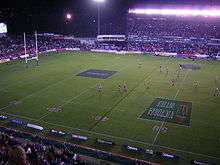 |
Newcastle | 33,000 | New grandstand is currently under construction bringing capacity to 33,000 for 2011. Further expansion for the tournament will bring capacity to 42,000. Stadium is possible destination for round of 16 and quarterfinal matches in addition to the group stage matches. | Major upgrade | |
| Townsville Stadium | Townsville | 26,500 | Major upgrades to the stadium will bring the capacity to 40,000. Potential tournament matches include group stage, round of 16, and quarterfinals. | Major upgrade | ||
| Canberra Stadium | Canberra | 25,011 | A modern 40,000-seat stadium will be built alongside the existing stadium.[9] Potential matches during the tournament include group stage, round of 16, and quarterfinal matches. | New stadium | ||
| Carrara Stadium |  |
Gold Coast | 25,000 | Stadium was upgraded to 40,000-seat capacity. Redevelopment was completed in 2011 to become a principal feature for the 2018 Commonwealth Games bid. Group stage, round of 16, and quarterfinal matches are planned for Gold Coast Stadium. | Major upgrade | |
| Blacktown Stadium | Blacktown | 41,000 | New 41,000-seat stadium located in the western Sydney suburb of Blacktown. The stadium will be located in Blacktown Olympic Park, which was created for the 2000 Sydney Olympic Games to host softball and baseball events. Blacktown Stadium has been proposed to host group stage, round of 16, and quarterfinal matches in the submitted bid. | New stadium | ||
| Kardinia Park | 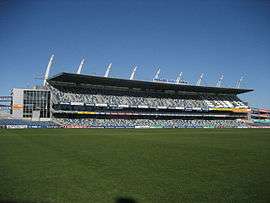 |
Geelong | 35,000 | Stadium capacity would be increased to 44,000 for the tournament. Currently undergoing construction of multi-tier eastern and southwestern stands. Proposed to host group stage, round of 16, and quarterfinal matches. | Major upgrade |
Rejected bid venues
The following is a list of stadiums that were considered at one time as part of the FFA's bid to host the 2022 FIFA World Cup, but did not make the final cut:
| Stadium | Image | Host city | State | Current capacity | Remarks | Current FIFA non-compliant field dimensions |
|---|---|---|---|---|---|---|
| Docklands Stadium | Melbourne | 53,359 | Reconfigurable stadium. availability ruled out – see below: Ground sharing issues | 170 m (length) | ||
| WACA Ground |  |
Perth | 24,500 | |||
| Wollongong Showground | 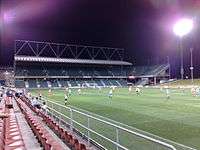 |
Wollongong | 20,000 | Western grandstand to be redeveloped from 2010 increasing capacity to 23,750.[10] Due to a road on Western side and beach on Eastern side of the stadium, it is not possible to upgrade the existing stadium, however a greenfield site has been suggested for a new stadium. | ||
| Football Park | 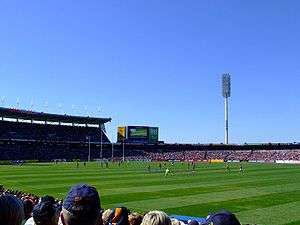 |
Adelaide | 51,240 | Oval Stadium with main seating bowl section too shallow and far from a proposed football pitch. Superseded by newly re-developed Adelaide Oval | 177 x 145 m | |
| Sydney Cricket Ground | 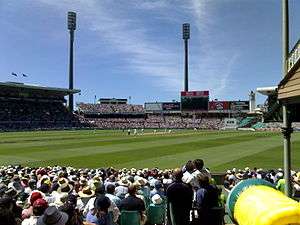 |
Sydney | 48,000 | 153 x 137 m | ||
| The Gabba | Brisbane | 42,000 | 171 x 150 m |
Ground sharing issues
Of the Australian stadiums that meet FIFA's seating criteria, none are primary association football venues. They are predominantly cricket, Australian rules football and rugby league playing venues. At the proposed time of the World Cup during the northern hemisphere summer, these facilities are normally in regular season use by Australian rules football and the rugby codes. Former England international, Peter Withe, now living in Australia, observes that "... there are some great stadiums in Australia but a lot of them are Aussie rules arenas. These are not great for the round ball."[11]
The need for all World Cup stadia to be used only for World Cup games prior to and during the World Cup has caused controversy with the Australian Football League[12] and National Rugby League,[13] who claim that loss of access to almost all their major venues for eight weeks would severely disrupt their seasons and even impact the viability of their clubs. The AFL in particular has advised it will not give up Docklands Stadium in Melbourne,[14][15] and the management of Docklands Stadium (which includes the AFL as part owners of the venue) has ruled out use of the stadium for the bid.[16] The use of these shared venues remains the only option for the bid, with the Australian authorities unwilling to invest massive amounts of money in new association football-only stadia.[17] The development of Kardinia Park (Skilled Stadium) in Geelong has been proposed to replace the loss of Docklands Stadium in the FFA bid, following the World Cup the stadium would be reconfigured to a larger oval for AFL use.[18] Compensation claims for the disrupted seasons of the local codes may run into several hundred million dollars. The AFL and NRL and possibly also the Australian Rugby Union (ARU) will lobby for equity from government.
The AFL, NRL and FFA announced it had signed a Memorandum of Understanding on 9 May 2010, guaranteeing the AFL and NRL seasons will continue, should the bid be successful, and compensation for the other football codes may be awarded as a result of any disruptions caused by hosting the World Cup.[19]
The seasons for Australia's football codes are as follows:
- "Q" denotes pre-competition qualifiers
- "S" denotes the start of the regular-season.
- "P" denotes playoff(s)/postseason/knockout stages.
- "F" denotes Final(s).
| League | Sport | Countries | Jan | Feb | Mar | Apr | May | Jun | Jul | Aug | Sep | Oct | Nov | Dec |
|---|---|---|---|---|---|---|---|---|---|---|---|---|---|---|
| A-League | Association football | P | F | S | ||||||||||
| AFL | Australian rules football | S | P F | |||||||||||
| NRL | Rugby league | S | P | F | ||||||||||
| Super Rugby | Rugby union | S | P | P F | ||||||||||
Cost concerns and benefits
Several stories[20][21][22] in the Australian media question the restrictions and privileges that FIFA will demand of host cities at taxpayer expense, in addition to the need to build and improve so many stadia[23][24] or whether "mega-events" like the World Cup are cost-effective.[25] The FFA has argued that these costs are overstated.[26]
A report conducted by McKinsey consultants on behalf of FIFA, rated an Australian World Cup to be the worst in term of revenue. The United States were rated at 100%, Japan 73%, South Korea 71%, Qatar 70%, and Australia on 68%.[27]
A study by global research firm IBISWorld claimed that the 2022 World Cup would be worth $35.5 billion to the Australian economy - four times the amount generated by the 2000 Sydney Olympics.[28]
Government support
Australia's bid has received government support from an early stage, with former-Prime Minister John Howard announcing federal and state/territory government support before FFA announced their intention to bid.[29]
Bid Chairman Frank Lowy AC announced at the bid launch that he has the personal commitment of the then-Australian Prime Minister, Kevin Rudd, who announced the Federal Government's support for the bid in February 2008. In December 2008, Federal minister for sport Kate Ellis announced that the federal government would give Football Federation Australia $45.6 million[30] to fund its World Cup bid preparation. Leader of the Opposition Malcolm Turnbull affirmed the support of the Opposition on 11 December 2008[31] and again at the formal launch of the bid in June 2009.[32]
Rudd met with Sepp Blatter to discuss the Federal Government's support of the bid in Zurich in July 2009.[33]
On 23 December 2009, with concerns over costs and effects of the bid upon other sporting codes, the Federal Government established a task force to take over much of the communication lacking by the bid in Australia. The taskforce will negotiate with governments regarding responsibility for stadium improvements, new facilities and financial guarantees. It will also organise and clarify ground-sharing arrangements with other sports and possible compensation for loss of venues.[34]
Bid website
Australia's bid website was launched 14 June 2009 and contains bid information as well as being a social media platform where users can share content and connect with each other.
At the launch, FFA chairman Frank Lowy AC said the people of Australia were its "secret weapon" to snaring the 2018 or 2022 FIFA World Cup and encouraged the public to join the Association football-themed social networking web site. The public campaign is the first bid for a major event driven almost entirely by social media.[35] Actress Nicole Kidman, actor Hugh Jackman, model Elle Macpherson[36] and sports stars Ian Thorpe (swimming), Liz Ellis (netball), Mark Webber (Formula One) and Steve Waugh (cricket)[37] have joined to help promote the bid.
Official bid partners
References
- Silkstone, Dan (3 December 2010). "Qatar wins 2022 World Cup, Australia first eliminated". The Age. Melbourne.
- "Australia dumps 2018 World Cup bid". The Sydney Morning Herald. Fairfax Media. 11 June 2010. Archived from the original on 13 June 2010. Retrieved 10 June 2010.
- Goff, Steve (16 January 2009). "Future World Cups". The Washington Post. Retrieved 16 January 2009.
- "Watch Australia present bid" at Fox Sports (30 November 2010)
- "FIFA receives bidding documents for 2018 and 2022 FIFA World Cups" (Press release). FIFA.com. 14 May 2010. Archived from the original on 29 July 2010. Retrieved 31 July 2010.
- "Australia launches dual World Cup bid". ABC. Archived from the original on 2 October 2009. Retrieved 17 September 2009.
- "AUSTRALIAN WORLD CUP STADIUMS". austadiums.com. Archived from the original on 13 April 2014. Retrieved 12 April 2014.
- http://perthstadium.com.au/
- http://www.canberratimes.com.au/news/local/news/general/new-act-stadium-in-world-cup-bid/1830922.aspx
- http://www.northernleader.com.au/article/win_stadium_gets_29m_boost1/
- "AFL fuming over soccer World Cup demands". Herald Sun. Retrieved 6 December 2009.
- "AFL concerns over world cup run deep". ABC. Retrieved 21 December 2009.
- "Soccer's plan to displace NRL". The Daily Telegraph. Retrieved 21 September 2009.
- "Cup bid needs to share the vision". The Sydney Morning Herald. 13 December 2009.
- Vaughan, Roger (18 March 2010). "We won't be second to World Cup: AFL CEO". The Age. Melbourne. Archived from the original on 22 March 2010. Retrieved 20 March 2010.
- "Etihad stadium chief rules out world cup games". Herald Sun. Retrieved 27 February 2010.
- Cockerill, Michael (5 December 2009). "Two white elephants are born in Africa - Australia mustn't breed own". The Sydney Morning Herald. Archived from the original on 5 December 2009. Retrieved 6 December 2009.
- "Geelong World Cup stadium push". Herald Sun. Retrieved 1 March 2010.
- Walter, Brad (10 May 2010). "Rival codes finally shake hands on deal to play through World Cup". The Sydney Morning Herald. Archived from the original on 12 May 2010. Retrieved 19 May 2010.
- "Strings attached to world cup bid". WA Today. Archived from the original on 17 December 2009. Retrieved 21 December 2009.
- Pascoe, Michael (14 December 2009). "Beware the coming soccer circus". The Sydney Morning Herald. Archived from the original on 17 January 2010. Retrieved 21 December 2009.
- Brodie, Will (14 December 2009). "Kennett criticises world cup planning". The Age. Melbourne. Archived from the original on 17 January 2010. Retrieved 21 December 2009.
- "World cup bid needs reality cheque". Sunday Herald Sun. Retrieved 21 December 2009.
- "Up to $200m to upgrade stadium for world cup – out of whose pocket?". The Australian. Retrieved 21 December 2009.
- Berg, Chris (27 December 2009). "Buying our love with our money is just not sporting". The Sydney Morning Herald. Archived from the original on 31 December 2009. Retrieved 27 December 2009.
- "FFA scoffs at world cup takeover". WA Today. Archived from the original on 16 December 2009. Retrieved 21 December 2009.
- https://www.theguardian.com/football/2010/nov/30/england-us-world-cup-fifa Guardian: Fifa report backs England and US World Cup bids as most profitable (30 November 2010)
- http://www.sportbusiness.com/news/178981/australia-2022-world-cup-would-generate-36-billion
- Halloran, Jessica (15 July 2006). "World Cup bid for 2018 gets political clout". The Age. Melbourne. Retrieved 3 January 2010.
- "FFA receive A$45m for World Cup bid". Sport Business. Retrieved 20 November 2009.
- "2018 Soccer World Cup – Malcolm Turnbull". malcolmturnbull.com.au. Archived from the original on 13 October 2009. Retrieved 20 November 2009. {{ Russia World Cup "Archived copy". Archived from the original on 19 August 2014. Retrieved 18 August 2014.CS1 maint: archived copy as title (link) date=October 2010|bot=H3llBot}}
- "Australia's Bid for the 2018–2022 FIFA World Cup – Malcolm Turnbull". malcolmturnbull.com.au. Archived from the original on 4 October 2009. Retrieved 20 November 2009. {{World Cup 2018 stadium Archived 19 August 2014 at the Wayback Machine|date=October 2010|bot=H3llBot}}
- "Australian Prime Minister Kevin Rudd Meets Sepp Blatter To Discuss World Cup Bid". Goal.com website. Retrieved 20 November 2009.
- Silkstone, Dan (27 December 2009). "Cup bid takeover conveniently buried in Christmas crush". The Age. Melbourne. Archived from the original on 30 January 2010. Retrieved 27 December 2009.
- "Australians asked to Twitter way to World Cup bid glory". The Australian. Archived from the original on 31 December 2012. Retrieved 20 November 2009.
- "Elle joins World Cup bid". Special Broadcasting Service. 17 June 2010.
- "Waugh backs Oz Cup bid". FourFourTwo (Australia). 13 June 2010.
- Qantas announced as Australia's first Official 2018/2022 FIFA World Cup Bid Partner Archived 19 November 2010 at the Wayback Machine. 31 March 2010. Retrieved 23 November 2010.
- Cisco backs Australia's bid for 2018–2022 World Cup. 6 May 2010. Retrieved 23 November 2010.
- PwC backs Australia 2022 World Cup bid. 23 September 2010. Retrieved 23 November 2010.
